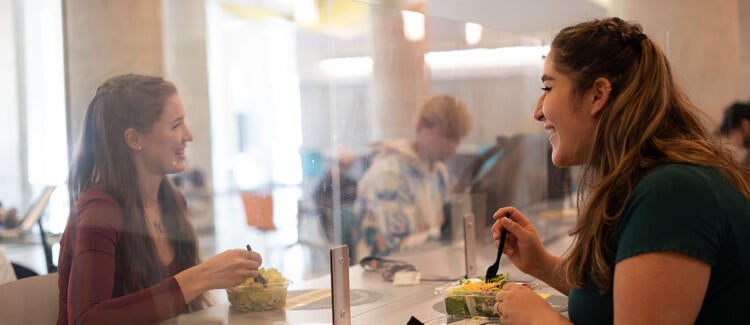
During the pandemic, we were encouraged to isolate ourselves, keep six feet apart, wear our masks, and sanitize our hands to keep ourselves and others safe. For many, this has resulted in or reinforced existing social anxiety. As physical distancing restrictions ease and classes are back on campus, we have to readjust to socializing again and this may not be easy for everyone.
Social anxiety is increasingly common and a normal human reaction both during and after the pandemic. Here are some tips to reconnect with others in-person and manage your anxiety:
1. Self-compassion as a tool
Humans are creatures of habit – we like routine and consistency, so change is generally hard for many people. As we transition back to in-person activities and socializing, it can be physically and emotionally tiring so it’s important to be kind to yourself as you adjust to socializing again. Take a look at Dr. Kristin Neff’s Self-Compassion Guided Practices and Exercises to learn how you can be more compassionate towards yourself.
2. Take it slow and allow yourself time to ease back into socializing
It may feel like you need to make up for lost time but filling your social calendar can become overwhelming and make social anxiety worse. Listen to what you need day-by-day and respect your boundaries.
3. Approach, don’t avoid
While it feels good in the moment, avoiding all social interaction can make social anxiety worse in the long run. Go slow and take small steps to connect with others. Gradually exposing yourself to social situations can help combat social anxiety by allowing us to face our fears and build confidence over time.
Examples:
- Try walking around campus before classes start to familiarize yourself
- Meet up with a friend for a quick 30-minute coffee catch up
- Sit in a less crowded study space and gradually work your way up to more populated areas
4. Practice self-soothing
When anxiety is high, it is a signal that our nervous system has become dysregulated. Everyone will experience this at some point and learning how to calm your body so you can be your best self is a very important skill. Try visualizing your favourite calm space, listening to music, diaphragmatic breathing, or even just naming that feeling. These strategies are great because they can be done anywhere!
5. Connect early and join in-person and virtual communities
Did you know that having social supports and connections is one of the most powerful ways to deter the effects of stress? Start joining clubs that interest you or find your favourite places to go. The Waterloo Undergraduate Student Association (WUSA) and Graduate Student Association offers many clubs and social activities you can join.
If you’re worried about overstepping boundaries and aren’t sure what level of comfort others have with social activities, be direct and ask them. Are they comfortable meeting for lunch on a patio? How about a socially distanced walk while wearing masks? These conversations may feel awkward but that’s completely normal. After a year in isolation, we may feel as though we have forgotten how to communicate. Check out Bustle’s article for some ideas on making small talk post-pandemic.
Download the Back to Campus Guide (.pdf) to refer back to these resources when you need it most.




